It’s been 16 years since Stan McGuire died from Parkinson’s disease and his wife of nearly 46 years is making sure his legacy is not forgotten.
Stan, a retired marketing and tourism instructor at Georgian College, was 68 when he was diagnosed with Parkinson's in 1998, his wife Liz McGuire told BarrieToday, adding her husband initially thought he was merely stiff from “sleeping funny.”
“When he first thought he had something wrong with him, he’d wake up in the morning and say his arm was stiff or things like that. We all think it’s the way we’re sleeping or whatever,” she says.
It was while celebrating Thanksgiving that a friend was able to convince her husband to finally go see a doctor.
“He was supposed to be carving the turkey and he couldn’t carve it… and he blamed the knife,” Liz says, looking back on the day that changed their lives. “We had friends visiting at the time and I could say as much, but (coming from) somebody else… they said they thought he should see a doctor. ... And he did.”
Stan went alone to that first doctor’s visit and it was then his physician told him he believed it was more than just a stiff arm, she says.
“The doctor said, 'Stan, walk across the room for me' and when he saw Stan walk and not swing his arms, he said 'I believe you have Parkinson's'," Liz says. "It was kind of a blow, but at the time we didn’t know the ins and outs of Parkinson's. Like many people, we thought it was just a tremor.”
Parkinson Canada describes the condition as a chronic, degenerative brain disease, resulting from the loss of dopamine-producing neurons. Dopamine controls a person’s motor functions, or voluntary movements, such as walking, speech and handwriting. It also affects non-motor functions such as mood, attention and sleep. When the dopamine-producing cells die, Parkinson symptoms appear. The organization also says Parkinson’s is not a normal part of aging.
The diagnosis definitely changed the McGuires' lives.
“At times, we would just wonder what was going to happen. As we’d learn about the possible things that would happen, you get to feel much worse. We all thought it was a tremor; we didn’t know all the side effects that would occur," Liz says.
Her husband’s health deteriorated rapidly, she says, adding he was eventually also diagnosed with Lewy body dementia in 2004, which occurs because of abnormal deposits of a protein called alpha-synuclein that develop inside the brain’s nerve cells, and can lead to problems with thinking, movement, behaviour, and mood.
"He was good until 2003 and then that’s when he started to go downhill,” Liz says.
In 2004, Stan began having hallucinations and was falling down, unable to get back up on his own. He was also struggling to dress himself, and everyday tasks, such as like shaving, brushing his teeth and eating, were becoming increasingly difficult.
Despite his health struggles, Liz described her husband as a “happy guy” who did his best to maintain his positive attitude.
“If you asked how he was, before he was diagnosed, he always used to say 'I’m happy, I’m healthy, I’m terrific'... and he did manage to say that almost right to the end of his life,” she says. “A lot of it was probably put on, but he did always try to convey (being) a happy person.”
As a former Parkinson Canada support group facilitator in Barrie, Liz knows how important having support is when going through this type of health journey, either as the patient or a loved one. She urged people not to do it alone.
"Get help, get involved with the Parkinson’s Society and find out what is out there to help you. Like everything else, it’s important to know what’s out there to help you and to help you with your life with Parkinson's," she says.
Since April is Parkinson’s Awareness Month, and today is World Parkinson’s Day, Parkinson’s Canada will be sharing stories of those affected by the world's fastest-growing neurological disease, with Canada experiencing among the highest prevalence rates, with approximately 100,000 individuals diagnosed with Parkinson’s.
For the month of April, you’ll spot the hashtag #PartnersInParkinson and #PartenairesParkinson on Facebook, Twitter, Instagram, and LinkedIn, with messages highlighting support groups, educational publications, information and referral, and other resources.
Canadians are invited to share their stories during Parkinson’s Awareness Month using those hashtags.






